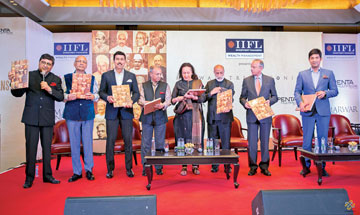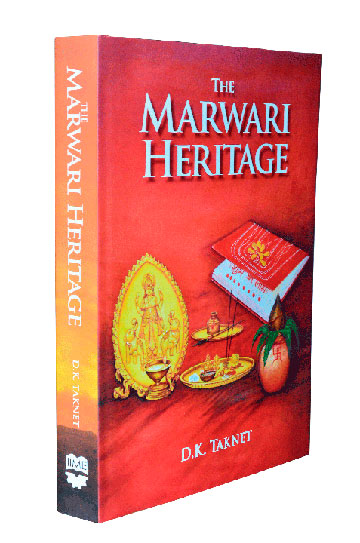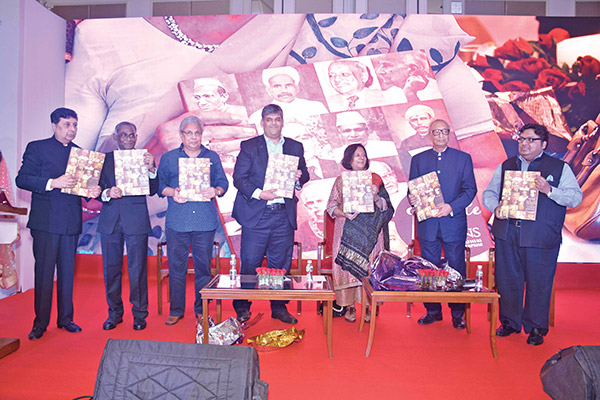
Marwar Tribute Night
A Tribute to Titans
The Marwari community is replete with illustrious names, be they pioneering business leaders, nationalists, towering personalities, humanists or devotees of art and culture. Often unsung, to give them the prominence they deserve, MARWAR was launched over a couple of decades ago and has been since delighting readers with inspiring profiles, culture stories, photo essays and insightful articles on them and their home state Rajasthan.
The Indian industry has commendably extended its footprint to almost every corner of the globe today, but way back in the eighteenth and nineteenth centuries, it was still at its nascence, with pioneering entrepreneurs and industrialists struggling against all odds under a biased British system, to lay the foundations of a home industry, spurred by nationalistic fervour. Remembering these committed, dauntless founding fathers of Indian enterprise and their immense contribution to national growth, MARWAR has been featuring the most outstanding among them through a series of tribute stories, written by Joseph Rozario, over the last few years.
Hugely inspirational and informative, these stories in effect constitute a glowing chapter of Marwari heritage and are worthy of being told and retold, in view of which MARWAR has crystallised them in a coffee-table book titled A Tribute to Titans: The Founding Fathers of Marwari Enterprise, which was launched at a glittering ceremony last September in Mumbai. It has now been ceremoniously presented in Delhi also, with equal fervour and fanfare. The event, titled MARWAR Tribute Night, was hosted by the editor of MARWAR, Maneck Davar (who also is the chairman of Spenta Multimedia Pvt Ltd and the publisher of MARWAR), on March 16, 2018, at The Oberoi, Delhi with over 150 guests, constituting the crème de la crème of the city in attendance.
The evening’s programme began with anchor Ambreen Khan (who heads the corporate communications wing of The Indian Express, New Delhi) formally welcoming the guests and inviting renowned folk musician Kutle Khan and his team of musicians, The Kutle Khan Project, on the podium, who set the tone of the evening with a passionate rendition Rajasthani folk music.
Next up was a welcome speech by host Maneck Davar, who began by welcoming the guests and thanking VN Dalmia, Raian and Manik Karanjawala and Deepshikha Khaitan for extending their support to ensure the success of the event. Speaking about A Tribute to Titans, he lauded Marwaris for their mercantile spirit, especially the larger-than-life personalities who have been featured in the book, who despite being largely unlettered, had taken their uncanny financial ability, their risk-taking ability, their ability to do hard work and their never say die spirit to every corner of the country, in the pursuit of success.
Anirudha Taparia, Executive Director, IIFL Wealth Management Ltd, took over the podium next. As the top wealth management company in the country, he expressed IIFL Wealth Management’s privilege to share stage with a community synonymous with wealth creation. He also thanked MARWAR for organising the event to honour the Marwari community.
The much-awaited panel discussion followed next, where eminent panellists spoke and debated on the topic ‘How Relevant is Tradition to Marwaris Today’. Among them were Harsh Pati Singhania, the vice chairman and managing director of JK Paper Ltd; Dr Abhishek Manu Singhvi, who is a Member of Parliament, a national spokesperson for the Indian National Congress and a senior advocate at the Supreme Court of India; Minaakshi Dass, the founder and CEO of India Heritage Desk; Gaurav Dalmia, the chairman of Dalmia Group Holdings; and Anirudha Taparia. The event was moderated by Aman Nath, who is an author and the founder and chairman of Neemrana Hotels. The stimulating discussion revolved around interesting viewpoints of the panellists which we have highlighted in a separate section that follows.
The panel discussion gave way to the actual presentation of A Tribute to Titans: The Founding Fathers of Marwari Enterprise, which saw Rajyavardhan Singh Rathore, Minister of State (Independent Charge) for Youth Affairs & Sports and Minister of State for Information & Broadcasting, join Maneck Davar, Anirudha Taparia and the participants of the panel discussion on the podium to formally present the book, together with the guests, who held up their personal copies amidst thunderous applause. It made for a grand spectacle which served as a befitting finale to the memorable evening that concluded with a gala dinner.
How Relevant is Tradition to Marwaris Today
 The panel discussion at the Marwar Tribute Night turned out to be one of the most stimulating and thought-provoking chapters of the evening, where eminent panellists debated and expressed their views on the topic ‘How Relevant is Tradition to Marwaris Today’. Among them were Harsh Pati Singhania, the vice chairman and managing director of JK Paper Ltd; Dr Abhishek Manu Singhvi, who is a Member of Parliament, a national spokesperson for the Indian National Congress and a senior advocate at the Supreme Court of India; Minaakshi Dass, the founder and CEO of India Heritage Desk; Gaurav Dalmia, the chairman of Dalmia Group Holdings; and Anirudha Taparia, the executive director of IIFL Wealth Management Ltd. The event was moderated by Aman Nath, who is the founder and chairman of Neemrana Hotels.
The panel discussion at the Marwar Tribute Night turned out to be one of the most stimulating and thought-provoking chapters of the evening, where eminent panellists debated and expressed their views on the topic ‘How Relevant is Tradition to Marwaris Today’. Among them were Harsh Pati Singhania, the vice chairman and managing director of JK Paper Ltd; Dr Abhishek Manu Singhvi, who is a Member of Parliament, a national spokesperson for the Indian National Congress and a senior advocate at the Supreme Court of India; Minaakshi Dass, the founder and CEO of India Heritage Desk; Gaurav Dalmia, the chairman of Dalmia Group Holdings; and Anirudha Taparia, the executive director of IIFL Wealth Management Ltd. The event was moderated by Aman Nath, who is the founder and chairman of Neemrana Hotels.
We bring you interesting sound bytes from the panel discussion.
Aman Nath
 Good evening, ladies and gentlemen! Quite simply, this is called Suraj ko roshni dikhana, because I am not a Marwari that I should be talking about Marwaris, with Marwaris and to Marwaris. But my only claim is that sometimes because you are born in the community, you don’t value yourself. It was 42 years ago … my first book was on Marwaris, and I can tell you at that time the word ‘Marwari’ had a slightly pejorative connotation.
Good evening, ladies and gentlemen! Quite simply, this is called Suraj ko roshni dikhana, because I am not a Marwari that I should be talking about Marwaris, with Marwaris and to Marwaris. But my only claim is that sometimes because you are born in the community, you don’t value yourself. It was 42 years ago … my first book was on Marwaris, and I can tell you at that time the word ‘Marwari’ had a slightly pejorative connotation.
I once wrote a long article on Marwaris and Mr LN Jhunjhunwala of Bhilwara called me and said, “Maan gaye, kitna achcha article likha hai! Mujhe 100 copies chahiye iski.” I asked what did he like about it, and he said, “I want to send it to all my Marwari friends because it ends very well.” It actually said that all the virtues for which the Marwaris were known were being lost one by one.
You have the trinity… let’s say Brahma, Vishnu, Mahesh. I am applying that to the Marwari community: There is a creator of wealth, the Bramha, and it creates a huge amount of wealth for the second generation, which is the preserver. And the third generation sets in the cycle of decadence.
One of the Marwari strengths was that it had continuity. They say, if three generations keep their heads on the shoulders, an empire can be made; but if five generations keep their heads on the shoulders, a dynasty can be made.
Harsh pati Singhania
 I think the question asked was in terms of what the assets of Marwaris were and there has been some discussion around that. Let me slightly digress from the asset side, because conversation has opened up about the first, second and third generations of Marwaris.
I think the question asked was in terms of what the assets of Marwaris were and there has been some discussion around that. Let me slightly digress from the asset side, because conversation has opened up about the first, second and third generations of Marwaris.
See, in my view, when the first generation comes—and I don’t confine this to Marwaris alone—they have little to lose, in a way, because they did not have anything to begin with. When you are in that circumstance, you are willing to risk a lot. You also have to work hard. Let’s look back at what the environment was in Rajasthan. It was hostile in terms of resources, and it was very austere. That’s why you’ve seen migration of Marwaris away to towns like Calcutta [now Kolkata] and Bombay [now Mumbai]and a whole bunch of other places. My family emigrated, wandering through into UP, many generations ago. And it was a very difficult environment then so there was little to lose. And therefore, the first generation did what they did. Of course, there were several people who failed.
The second generation comes in seeing some of all this, or seeing a lot, and they emulate; but they are a little better off. And the third generation is born relatively privileged. But it’s the value system… it works when values are taught that along with privilege comes accountability and responsibility. So, my submission would be that families that have taught their next generations those values have perhaps survived and done better. That’s the perspective we’ve got to see, and I think, it’s not confined to Marwaris; it’s a global phenomenon.
But I consider myself privileged. When I look back at one of the founders here—Lala Kamlapat Singhania—I consider myself privileged, because I am a fourth generation. I am not saying that in a matter of boastfulness, but because I truly value… That’s what the family and the elders in society taught me.
Dr Abhishek Manu Singhvi
 I don’t know how many of you know it—but certainly some of the non-Marwaris may not know it—the capital of Marwar is Jodhpur. I am from Jodhpur. And ‘Marwari’ had nothing to do with the vocational occupational definition. This is a corruption of later times. ‘Marwari’ was simply somebody from Marwar; it was a geographical classification—just like ‘Gujarati’ is somebody from Gujarat. I am very much from Marwar, without being in that sense a Marwari, because I am not a businessman. The origin of the word was geographical, but because all these great industrialists with huge moneybags have become so famous, therefore, Marwaris are associated with business.
I don’t know how many of you know it—but certainly some of the non-Marwaris may not know it—the capital of Marwar is Jodhpur. I am from Jodhpur. And ‘Marwari’ had nothing to do with the vocational occupational definition. This is a corruption of later times. ‘Marwari’ was simply somebody from Marwar; it was a geographical classification—just like ‘Gujarati’ is somebody from Gujarat. I am very much from Marwar, without being in that sense a Marwari, because I am not a businessman. The origin of the word was geographical, but because all these great industrialists with huge moneybags have become so famous, therefore, Marwaris are associated with business.
Now, about your point about strengths and weaknesses, I think it is the obvious: strengths—values of thrift very early on, values of hard work… An interesting analogy would be, if you go abroad, you find generally—in communities which have more of these two nationals—Chinese and Indians do very well. So that’s a lot ascribed to values of thrift and education and hard work and to some extent, risk taking. That happens within India more with certain communities, and, I think, it certainly happens a lot with Marwaris and possibly also Gujaratis.
But, I would say that Marwaris are certainly not as progressive as those from their sister state of Gujarat. I don’t say it only because I have a daughter-in-law from Gujarat, but actually I think we still relatively remain conservative. That probably, in one sense, is one of the weaknesses. But we have a very mixing approach to the communities we go to. I mean, the saying is famous about the Parsis—I think the Sanjan—that ‘You will mix like sugar with milk.’ But a lot of Marwaris too have done that successfully. They are envied and sometimes criticised for their commercial success, but there are a large number of stories about how well they have been received in communities foreign to the Marwaris. I have a very interesting example which I read some time ago about the Rajput ruler of Bikaner, Suraj Singh, saying that ‘This Marwari family is so respected here—this Poddar family—that I am passing a decree permitting them, or forgiving them up to three murders.’ So, you know, Marwaris have also integrated well. But certainly, I think we are not as progressive as we should be, generally speaking, as some communities. And the reasons for hate are quite common. I think commercially successful communities do evoke a certain amount of it… the Jews have done it, some communities in Poland have faced the same reaction… there’s a mix of both envy and admiration.
I went to Jagdalpur, Bastar, about 25 years ago—much less developed then than now—and I found one lone grocery shop in the middle of nowhere. And Jagdalpur is the capital of the world’s largest tribal district, Bastar! That man was a Marwari: Lunia. He had come from Rajasthan some three generations earlier. He was very greatly admired, but also hated, as he was the only chap there who could do commerce and who could charge money. But he was doing a service.
Minaakshi Dass
 First of all, I must thank Maneck Davar for having a lady on the stage. To my brothers, my Marwari brothers and the community, I am very happy to be here, because the basic discussion is about culture and ethics. I am a baniya and I am proud to be a baniya. Whatever Marwaris have done for the society in India is phenomenal. I disagree with Aman that they have become ostentatious. Basically they derive pleasure out of simplicity, and they are totally connected to their roots. Any Marwari household you go to will serve vegetarian food, which is fantastic. Marwaris, even now—I don’t know about the younger generations—know a lot about the culture, the adaas, the pranam, the basic courtesy… it’s ingrained in them. Basically, I think culture is a very integral part of Marwaris; they stick to it, all their children stick to it. They are very articulate in what they do.
First of all, I must thank Maneck Davar for having a lady on the stage. To my brothers, my Marwari brothers and the community, I am very happy to be here, because the basic discussion is about culture and ethics. I am a baniya and I am proud to be a baniya. Whatever Marwaris have done for the society in India is phenomenal. I disagree with Aman that they have become ostentatious. Basically they derive pleasure out of simplicity, and they are totally connected to their roots. Any Marwari household you go to will serve vegetarian food, which is fantastic. Marwaris, even now—I don’t know about the younger generations—know a lot about the culture, the adaas, the pranam, the basic courtesy… it’s ingrained in them. Basically, I think culture is a very integral part of Marwaris; they stick to it, all their children stick to it. They are very articulate in what they do.
Marwaris have created a lot of jobs over the period of time.
Marwaris today, I would think are more open-minded. They are getting their girls into business, which for me is a very important step forward; they are sending their girls abroad to study and they are getting married into business families. I think they’re giving their girls better opportunities to stand up for themselves.
I also want to say that Marwari housewives have been a great support to their husbands, and Marwari ladies should be credited too; it’s not a patriarchal society… I think education for girls also is a fabulous idea. Marwaris are extremely progressive in their thinking and that’s why they are so successful.
Gaurav Dalmia
 I think, first of all, culture matters. We tend to believe in an educated, rational society that culture doesn’t matter, but that is not a fact. I think, in the late 90s, Harvard had a symposium called Culture Matters, and they came out with a remarkable book which I suggest everyone should read. There is this author called Joel Kotkin, who identified some of the great traits of successful communities. He found three things: One was ethnic identity; the second was global trust network; and the third was passion for technical knowledge. And if you look at all successful communities, they share these three traits. Marwaris have these traits more than certain other communities. They are not unique, but they are more than other communities. I think this is what has been driving Marwaris, generation after generation. If you were to take a poll today and rank on these variables, I think the Marwari community would rank very high; not just within India but also globally.
I think, first of all, culture matters. We tend to believe in an educated, rational society that culture doesn’t matter, but that is not a fact. I think, in the late 90s, Harvard had a symposium called Culture Matters, and they came out with a remarkable book which I suggest everyone should read. There is this author called Joel Kotkin, who identified some of the great traits of successful communities. He found three things: One was ethnic identity; the second was global trust network; and the third was passion for technical knowledge. And if you look at all successful communities, they share these three traits. Marwaris have these traits more than certain other communities. They are not unique, but they are more than other communities. I think this is what has been driving Marwaris, generation after generation. If you were to take a poll today and rank on these variables, I think the Marwari community would rank very high; not just within India but also globally.
I was in New York last year and we were having a lighthearted conversation over dinner about which was the most successful community in the world. The unanimous conclusion was: the Jews. Then we said which was the second most successful community in the world, and almost everyone put Marwaris as a serious contender.
So Marwaris actually are a globally recognised community for the variables that they have and, therefore, I would say that I am proud to be a Marwari.
Anirudha Taparia
 We’ve already talked about cultural ethics so I will just add a bit of perspective, especially from our part, since you talked about risk. Since we deal with a lot of clients who are Marwari first generation, second generation, third generation entrepreneurs, one is seeing a little bit of distinct difference… Let me elaborate a little bit: In a lot of pockets, what we see—especially when people come to us to give us wealth to manage—is that the first and second generation entrepreneurs typically are very high risk takers in business, and the money given to us is largely for preservation. The new generation, which is coming in now, however, is slightly different. The risk-taking ability due to actually getting in and starting a business, and expand, is coming off, and the risk-taking ability on equity markets, etc, is going very high. So PEs, etc, are really going very high. But risk-taking—now that is unfortunate… For us it is damn good though, because the business is great for us. But on a serious note, when we meet clients, a lot of times when I come out of the meeting, I wish that he was putting more money back in the business, because we personally feel business can do extremely well going ahead. But that’s one of the challenges or dilemmas… I would probably put it that way.
We’ve already talked about cultural ethics so I will just add a bit of perspective, especially from our part, since you talked about risk. Since we deal with a lot of clients who are Marwari first generation, second generation, third generation entrepreneurs, one is seeing a little bit of distinct difference… Let me elaborate a little bit: In a lot of pockets, what we see—especially when people come to us to give us wealth to manage—is that the first and second generation entrepreneurs typically are very high risk takers in business, and the money given to us is largely for preservation. The new generation, which is coming in now, however, is slightly different. The risk-taking ability due to actually getting in and starting a business, and expand, is coming off, and the risk-taking ability on equity markets, etc, is going very high. So PEs, etc, are really going very high. But risk-taking—now that is unfortunate… For us it is damn good though, because the business is great for us. But on a serious note, when we meet clients, a lot of times when I come out of the meeting, I wish that he was putting more money back in the business, because we personally feel business can do extremely well going ahead. But that’s one of the challenges or dilemmas… I would probably put it that way.










